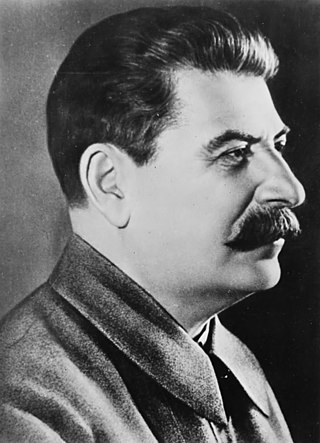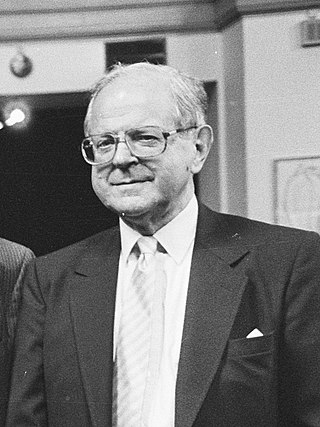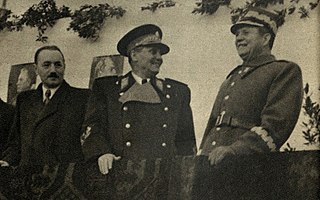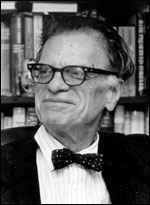
Leninism is a political ideology developed by Russian Marxist revolutionary Vladimir Lenin that proposes the establishment of the dictatorship of the proletariat led by a revolutionary vanguard party as the political prelude to the establishment of communism. Lenin's ideological contributions to the Marxist ideology relate to his theories on the party, imperialism, the state, and revolution. The function of the Leninist vanguard party is to provide the working classes with the political consciousness and revolutionary leadership necessary to depose capitalism.

Marxism–Leninism is a communist ideology that became the largest faction of the communist movement in the world in the years following the October Revolution. It was the predominant ideology of most communist governments throughout the 20th century. It was developed in Russia by Joseph Stalin and drew on elements of Bolshevism, Leninism, Marxism, and the works of Karl Kautsky. It was the state ideology of the Soviet Union, Soviet satellite states in the Eastern Bloc, and various countries in the Non-Aligned Movement and Third World during the Cold War, as well as the Communist International after Bolshevization.

Nikolai Ivanovich Bukharin was a Russian revolutionary, Soviet politician, and Marxist theorist. A prominent Bolshevik described by Vladimir Lenin as a "most valuable and major theorist" of the Communist Party, Bukharin was active in the Soviet leadership from 1917 to his purge in the 1930s.

Stalinism is the totalitarian means of governing and Marxist–Leninist policies implemented in the Soviet Union (USSR) from 1924 to 1953 by dictator Joseph Stalin and in Soviet satellite states between 1944 and 1953. Stalin had previously made a career as a gangster and robber, working to fund revolutionary activities, before eventually becoming General Secretary of the Soviet Union. Stalinism included the creation of a one man totalitarian police state, rapid industrialization, the theory of socialism in one country, forced collectivization of agriculture, intensification of class conflict, a cult of personality, and subordination of the interests of foreign communist parties to those of the Communist Party of the Soviet Union, which Stalinism deemed the leading vanguard party of communist revolution at the time. After Stalin's death and the Khrushchev Thaw, a period of de-Stalinization began in the 1950s and 1960s, which caused the influence of Stalin's ideology to begin to wane in the USSR.

Totalitarianism is a political system and a form of government that prohibits opposition political parties, disregards and outlaws the political claims of individual and group opposition to the state, and controls the public sphere and the private sphere of society. In the field of political science, totalitarianism is the extreme form of authoritarianism, wherein all socio-political power is held by a dictator, who also controls the national politics and the peoples of the nation with continual propaganda campaigns that are broadcast by state-controlled and by friendly private mass communications media.

George Robert Acworth Conquest was a British and American historian, poet, and novelist. He was briefly a member of the Communist Party of Great Britain but later wrote several books against Communism.

The Communist International (Comintern), also known as the Third International, was an international organization founded in 1919 that advocated world communism, and which was led and controlled by the Communist Party of the Soviet Union. The Comintern resolved at its Second Congress in 1920 to "struggle by all available means, including armed force, for the overthrow of the international bourgeoisie and the creation of an international soviet republic as a transition stage to the complete abolition of the state". The Comintern was preceded by the dissolution of the Second International in 1916. Vladimir Lenin, Leon Trotsky, and Joseph Stalin were all honorary presidents of the Communist International.

The general secretary of the Central Committee of the Communist Party of the Soviet Union was the leader of the Communist Party of the Soviet Union (CPSU). From 1924 until the country's dissolution in 1991, the officeholder was the recognized leader of the Soviet Union. Prior to Joseph Stalin's accession, the position was not viewed as an important role in Vladimir Lenin's government and previous occupants had been responsible for technical rather than political decisions.

Titoism is a socialist political philosophy most closely associated with Josip Broz Tito during the Cold War. It is characterized by a broad Yugoslav identity, socialist workers' self-management, a political separation from the Soviet Union, and leadership in the Non-Aligned Movement.
Soviet and communist studies, or simply Soviet studies, is the field of regional and historical studies on the Soviet Union and other communist states, as well as the history of communism and of the communist parties that existed or still exist in some form in many countries, both inside and outside the former Eastern Bloc, such as the Communist Party USA. Aspects of its historiography have attracted debates between historians on several topics, including totalitarianism and Cold War espionage.
The history of communism encompasses a wide variety of ideologies and political movements sharing the core principles of common ownership of wealth, economic enterprise, and property. Most modern forms of communism are grounded at least nominally in Marxism, a theory and method conceived by Karl Marx and Friedrich Engels during the 19th century. Marxism subsequently gained a widespread following across much of Europe, and throughout the late 1800s its militant supporters were instrumental in a number of unsuccessful revolutions on that continent. During the same era, there was also a proliferation of communist parties which rejected armed revolution, but embraced the Marxist ideal of collective property and a classless society.
Kremlinology is the study and analysis of the politics and policies of the Soviet Union while Sovietology is the study of politics and policies of both the Soviet Union and former communist states more generally. These two terms were synonymous until the dissolution of the Soviet Union. In an extended usage, Kremlinology is sometimes used to mean any attempt to understand a secretive organization or process, such as plans for upcoming products or events, by interpreting indirect clues.
Robert Charles Tucker was an American political scientist and historian. Tucker is best remembered as a biographer of Joseph Stalin and as an analyst of the Soviet political system, which he saw as dynamic rather than unchanging.
John Archibald Getty III is an American historian and professor at the University of California, Los Angeles (UCLA), who specializes in the history of Russia and the history of the Soviet Union.
Communism is a sociopolitical, philosophical, and economic ideology within the socialist movement, whose goal is the creation of a communist society, a socioeconomic order centered around common ownership of the means of production, distribution, and exchange that allocates products to everyone in the society based on need. A communist society would entail the absence of private property and social classes, and ultimately money and the state.

Brian Leonard Pearce was a British Marxist political activist, historian, and translator. Adept and prolific in Russian-to-English translation, Pearce was regarded at the time of his death as "one of the most acute scholars of Russian history and British communism never to have held an academic post."

The Information Bureau of the Communist and Workers' Parties, commonly known as Cominform, was a co-ordination body of Marxist-Leninist communist parties in Europe during the early Cold War that was formed in part as a replacement of the Communist International. It worked to ensure that communist governments in the Soviet bloc operated according to Stalinist principles, rather than those of alternative forms of communism. The Cominform was dissolved during de-Stalinization in 1956.
The anti-Stalinist left is a term that refers to various kinds of Marxist political movements that oppose Joseph Stalin, Stalinism, Neo-Stalinism and the system of governance that Stalin implemented as leader of the Soviet Union between 1924 and 1953. This term also refers to the high ranking political figures and governmental programs that opposed Joseph Stalin and his form of communism, such as Leon Trotsky and other traditional Marxists within the Left Opposition. In Western historiography, Stalin is considered one of the worst and most notorious figures in modern history.

Below is a list of post World War II scholarly books and journal articles written in or translated into English about communism. Items on this list should be considered a non-exhaustive list of reliable sources related to the theory and practice of communism in its different forms.

The Cold War from 1947 to 1948 is the period within the Cold War from the Truman Doctrine in 1947 to the incapacitation of the Allied Control Council in 1948. The Cold War emerged in Europe a few years after the successful US–USSR–UK coalition won World War II in Europe, and extended to 1989–1991. It took place worldwide, but it had a partially different timing outside Europe. Some conflicts between the West and the USSR appeared earlier. In 1945–1946 the US and UK strongly protested Soviet political takeover efforts in Eastern Europe and Iran, while the hunt for Soviet spies made the tensions more visible. However, historians emphasize the decisive break between the US–UK and the USSR came in 1947–1948 over such issues as the Truman Doctrine, the Marshall Plan and the breakdown of cooperation in governing occupied Germany by the Allied Control Council. In 1947, Bernard Baruch, the multimillionaire financier and adviser to presidents from Woodrow Wilson to Harry S. Truman, coined the term "Cold War" to describe the increasingly chilly relations between three World War II Allies: the United States and British Empire together with the Soviet Union.












